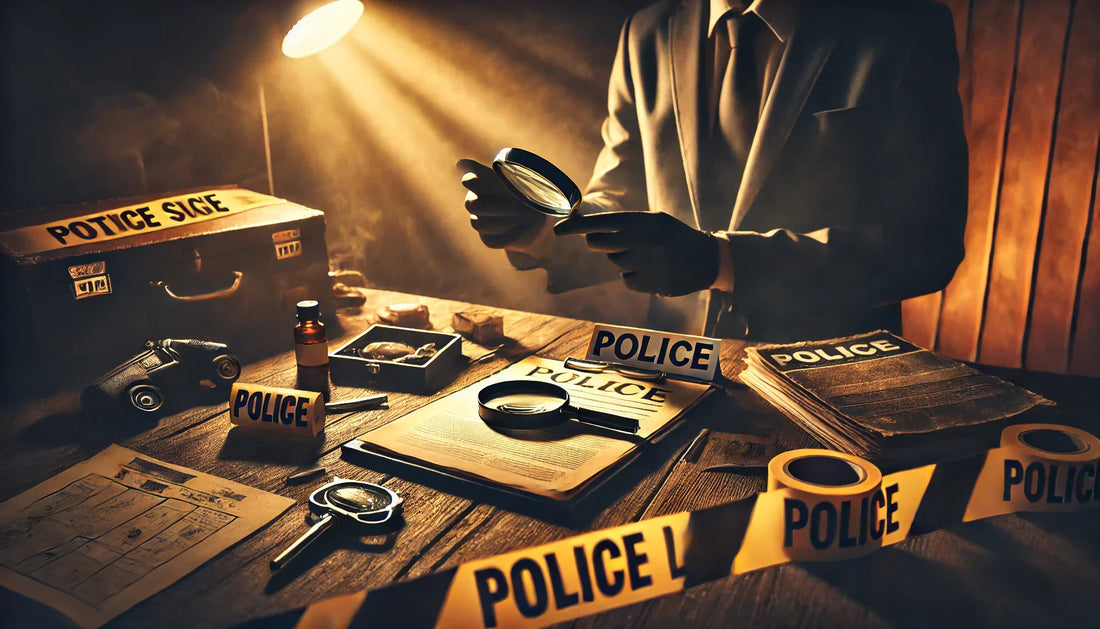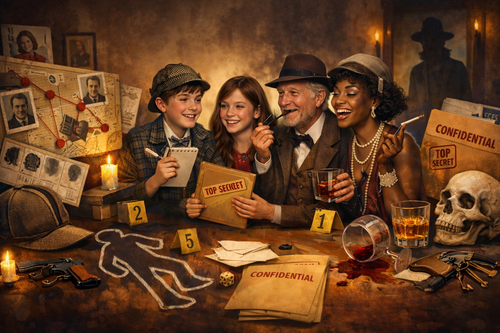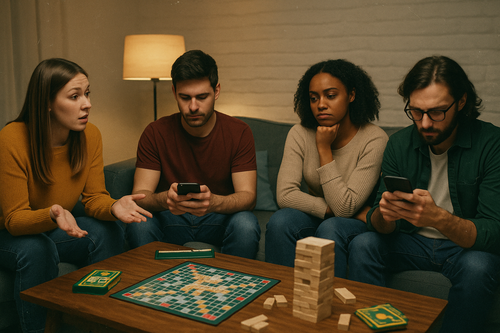
Unmasking the Allure: The Psychology Behind Our Fascination with Crime Shows
Share
The Psychology Behind Our Fascination with Crime Shows – And How You Can Take It Further
Crime shows have dominated television and streaming services for decades, captivating millions of viewers. From gripping police procedurals to in-depth true crime documentaries, these narratives draw us into the world of mystery, justice, and deception. But why are we so fascinated by crime stories? What does our obsession with criminal psychology say about us? And how can you turn that passive interest into something interactive and engaging?
Why Do We Love Crime Shows? The Psychological Appeal
Crime series tap into deep psychological and emotional triggers that keep us hooked. Understanding these factors can reveal more about our own personalities and motivations.
1. The Thrill of Mystery and Problem-Solving
At our core, humans love solving puzzles. Whether it’s putting together a jigsaw puzzle or working through a logic problem, our brains are wired for curiosity. Crime shows offer a unique blend of suspense and intellectual challenge, allowing viewers to play detective from the comfort of their homes.
Mystery-driven narratives engage the prefrontal cortex, the part of our brain responsible for reasoning and problem-solving. This is why fans of crime shows often find themselves trying to piece together clues before the detectives on screen do. It’s an engaging cognitive workout that makes crime dramas both stimulating and satisfying.
2. A Safe Way to Explore Danger and Fear
Crime stories allow us to experience fear and suspense in a controlled environment. Watching a murder mystery or a psychological thriller triggers our fight-or-flight response in a way that is both exciting and non-threatening. The same rush that people get from roller coasters or haunted houses can be found in crime series—without any real-life consequences.
Psychologists have found that many crime show fans score high in sensation-seeking traits, meaning they are drawn to experiences that create an adrenaline rush. This explains why some people can binge-watch Mindhunter, True Detective, or Criminal Minds for hours on end.
3. Understanding the Criminal Mind
Why do criminals commit crimes? What motivates them? Shows that explore forensic psychology and criminal behavior, such as Mindhunter and Dexter, offer a window into the darker aspects of human nature. This curiosity is deeply rooted in our desire to understand the world around us, including those who operate outside the bounds of morality and law.
Crime shows often provide insight into psychological disorders, profiling techniques, and forensic science, making them particularly fascinating to those interested in human behavior, criminology, or psychology.
Personality and Crime Show Obsession: What Your Favorite Shows Say About You
Your choice of crime shows may reveal something about your personality. Studies suggest that different personality types gravitate toward different kinds of crime narratives:
- True Crime Enthusiasts – Those drawn to real-life crime stories (e.g., Making a Murderer, Serial) tend to be highly analytical and detail-oriented. They often seek justice and enjoy dissecting real-world events.
- Psychological Thriller Fans – Fans of Mindhunter or Hannibal are often intrigued by human behavior and psychology. They may be more introspective and fascinated by moral dilemmas.
- Forensic Science Buffs – If you love CSI or Bones, you likely enjoy logical problem-solving and appreciate the science behind crime-solving.
- Mystery Solvers – Fans of Sherlock or Only Murders in the Building tend to be creative thinkers who enjoy piecing together clues and uncovering secrets.
Understanding what draws you to certain shows can help you engage more deeply with the genre and even find new ways to experience it.
The CSI Effect: How Crime Shows Shape Public Perception
Crime dramas have done more than entertain—they’ve also influenced how people perceive real-world crime and justice. The CSI Effect refers to how forensic-focused shows like CSI and NCIS have shaped public expectations of criminal investigations. Many viewers now believe that forensic evidence is always clear-cut and that every crime can be solved with DNA in under an hour. In reality, forensic investigations are far more complex and time-consuming.
This phenomenon has impacted jury decisions, police investigations, and even how people view law enforcement and forensic science. It highlights the powerful role that crime media plays in shaping public understanding.
Turning Your Crime Fascination into an Interactive Experience
If you love crime shows, why stop at just watching? There are many ways to turn your interest into an active, engaging experience:
- Personality Tests & Psychological Profiling – Take online tests to see what kind of detective, profiler, or suspect you would be. Many crime enthusiasts enjoy learning about their own psychological tendencies and how they align with famous fictional detectives.
- Escape Rooms & Crime Games – Interactive mystery games allow you to play the role of a detective. Min(d)gle Games offers immersive experiences that challenge you to solve crimes, analyze evidence, and think like a forensic expert.
- Murder Mystery Dinners – These events let you step into a crime story as a character, making the experience more personal and engaging.
- True Crime Podcasts & Book Clubs – If you love discussing real-life cases, consider joining a true crime book club or podcast discussion group.
Step Into the Mystery with Min(d)gle Games
At Min(d)gle Games, we create immersive crime-solving experiences that bring people together. Whether you want to test your detective skills in an interactive game or dive into a psychological mystery with friends, our games let you become part of the story. If you love the thrill of crime shows, why not step into the mystery yourself?
Explore our latest crime mystery games today!



